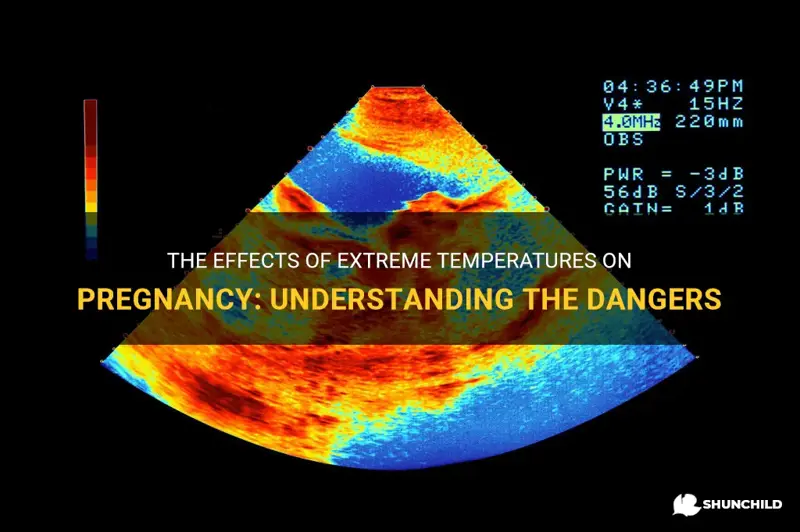
Pregnancy is a delicate time for expectant mothers, and ensuring the safety and well-being of both mother and baby is paramount. While many factors contribute to a healthy pregnancy, one often overlooked aspect is the temperature. Extreme heat or cold can pose serious risks to a pregnant woman, affecting her overall health and potentially impacting the development of the baby. Understanding what temperature is dangerous during pregnancy is crucial for expecting mothers to navigate their environment with caution and protect themselves and their little ones.
| Characteristics | Values |
|---|---|
| Increased risk of miscarriage | Above 102°F (38.9°C) |
| Increased risk of birth defects | Above 102°F (38.9°C) during first trimester |
| Increased risk of preterm labor | Above 100.4°F (38°C) |
| Increased risk of dehydration | Above 102°F (38.9°C) |
| Increased risk of heat exhaustion | Above 104°F (40°C) |
| Increased risk of heat stroke | Above 104°F (40°C) |
| Increased risk of fluid and electrolyte imbalances | Above 102°F (38.9°C) |
| Increased risk of stress on the fetal cardiovascular system | Above 102°F (38.9°C) |
| Increased risk of low birth weight | Prolonged exposure to high temperatures |
| Increased risk of pre-eclampsia | Prolonged exposure to high temperatures |
What You'll Learn
- What temperature is considered dangerous for pregnant women?
- Can high temperatures during pregnancy harm the baby?
- Are there any specific precautions pregnant women should take to avoid high temperatures?
- What are the signs or symptoms of overheating during pregnancy?
- Are there any long-term effects on the baby if a pregnant woman is exposed to high temperatures for an extended period of time?

What temperature is considered dangerous for pregnant women?
Pregnancy is a beautiful and transformative time for many women. However, it is also a time when one must exercise caution and take extra care of their health and well-being. One important factor to consider during pregnancy is exposure to extreme temperatures, as it can have potential risks for both the mother and the baby.
Extreme heat can be particularly dangerous for pregnant women. It is recommended for expectant mothers to avoid prolonged exposure to high temperatures, especially during the hot summer months. When the body overheats, it can lead to dehydration and an increased heart rate, both of which can have negative effects on the baby's development.
But what temperature is considered dangerous for pregnant women? Well, it is difficult to pinpoint an exact temperature, as various factors such as humidity, clothing, and individual tolerance levels play a role. However, it is generally agreed upon that temperatures above 90°F (32°C) should be approached with caution.
Prolonged exposure to high temperatures can cause a condition called hyperthermia in pregnant women. Hyperthermia occurs when the body's core temperature rises above the normal range, which is around 98.6°F (37°C). This can lead to a range of complications, including preterm labor, birth defects, and even fetal death.
To protect themselves from excessive heat exposure, pregnant women are advised to take certain precautions. These include:
- Stay hydrated: Drink plenty of water throughout the day to prevent dehydration. Pregnant women have an increased need for fluids, especially in hot weather.
- Dress appropriately: Wear loose-fitting, breathable clothing made of natural fabrics like cotton to help regulate body temperature. Avoid tight or synthetic fabrics that can trap heat.
- Seek shade: If you need to be outside, try to find shaded areas to rest and cool down. Avoid prolonged exposure to direct sunlight, as it can significantly increase body heat.
- Use cooling methods: Use fans, air conditioning, or cool compresses to help lower body temperature. Take cool showers or baths to provide relief from the heat.
- Avoid strenuous activities: Pregnancy is not the time for intense exercise or physical exertion. Engage in light, low-impact activities and listen to your body's cues to avoid overheating.
- Plan outdoor activities wisely: If you must be outdoors, try to schedule activities during the cooler parts of the day, such as early morning or late evening, to reduce heat exposure.
It's important to note that pregnant women may be more sensitive to heat due to hormonal changes and increased blood volume. This means that what may be considered a comfortable temperature for others could feel significantly hotter for a pregnant woman. It is crucial to listen to your body and take breaks whenever necessary.
In conclusion, extreme heat can pose risks to pregnant women and their developing babies. While the exact temperature threshold for danger may vary, it is generally recommended to avoid prolonged exposure to temperatures above 90°F (32°C). By taking the necessary precautions and being mindful of heat exposure, pregnant women can ensure their well-being and the health of their baby throughout their pregnancy.
The Most Common Sonographic Finding in Ectopic Pregnancy Unveiled
You may want to see also

Can high temperatures during pregnancy harm the baby?
Pregnancy is a delicate period in a woman's life, and certain factors can have an impact on the unborn baby's health. One common concern is whether high temperatures during pregnancy can harm the baby. In this article, we will explore the scientific evidence, personal experiences, step-by-step guidelines, and real-life examples to shed light on this important question.
Scientific evidence suggests that exposure to high temperatures during pregnancy can indeed pose risks to the unborn baby. The elevated body temperature caused by hot weather, saunas, hot tubs, or high fever can disrupt the delicate balance in the developing fetus. This can lead to various complications, including neural tube defects, organ malformations, and even spontaneous abortion.
Several studies have examined the link between high temperatures during pregnancy and adverse outcomes. One study conducted in California found that pregnant women exposed to extreme heat during the first trimester had a significantly higher risk of giving birth to babies with neural tube defects. Another study from Denmark showed that maternal exposure to high temperatures during pregnancy was associated with an increased risk of preterm birth.
Personal experiences also highlight the importance of avoiding high temperatures during pregnancy. Many women have reported feeling uncomfortable or overheated during hot weather or while in saunas or hot tubs. Some have even experienced fainting spells or dizziness due to excessive heat exposure. Such experiences serve as a reminder of the potential risks involved and the need for caution.
To protect the baby from high temperatures, it is crucial for pregnant women to take certain precautions. Here are some step-by-step guidelines to follow:
- Stay hydrated: Drink plenty of water to prevent dehydration, which can exacerbate the effects of high heat on the body.
- Limit outdoor activities: Avoid spending long periods of time in direct sunlight or hot weather, particularly during the peak heat hours.
- Dress in light, breathable clothing: Choose loose-fitting, lightweight fabrics that allow air circulation to keep the body cool.
- Seek shade or air-conditioned environments: When outdoors, find shaded areas or air-conditioned spaces to reduce heat exposure.
- Avoid hot baths, saunas, and hot tubs: These can increase your body temperature and pose risks to the developing baby.
Real-life examples further emphasize the significance of avoiding high temperatures during pregnancy. In countries with hot climates, health authorities often issue warnings and recommendations for pregnant women to protect themselves from extreme heat. This demonstrates the recognition of the potential harm that high temperatures can cause to both mother and baby.
In conclusion, high temperatures during pregnancy can indeed harm the baby. Scientific evidence, personal experiences, step-by-step guidelines, and real-life examples all support the notion that exposure to excessive heat can increase the risk of complications and adverse outcomes. Pregnant women should take the necessary precautions to stay cool and avoid prolonged exposure to high temperatures. It is always best to consult with a healthcare provider for personalized advice on managing heat exposure during pregnancy.
Understanding Ectopic Pregnancy: The Impact of a Fallopian Tube Removal
You may want to see also

Are there any specific precautions pregnant women should take to avoid high temperatures?
As temperatures rise during the summer months, pregnant women may be more susceptible to the risks of high temperatures and heat exposure. It is important for pregnant women to take certain precautions to ensure their well-being and the health of their unborn child.
- Stay hydrated: One of the most crucial steps pregnant women should take is to stay well hydrated. This means drinking plenty of water throughout the day, even if not feeling thirsty. Dehydration can increase the risk of heat exhaustion and heat stroke, which can be harmful to both the mother and the baby.
- Dress appropriately: Pregnant women should choose loose-fitting, lightweight, and breathable clothing to allow for better air circulation and to prevent overheating. Opting for light-colored clothing can also help to reflect sunlight and reduce heat absorption.
- Stay indoors during peak heat hours: Pregnant women should try to stay indoors during the hottest parts of the day, typically between 10 a.m. to 4 p.m. If outdoor activities are necessary, it is important to take frequent breaks in shaded areas and avoid direct sunlight as much as possible.
- Use fans or air conditioning: Keeping the indoor temperature cool is essential for pregnant women, particularly during heatwaves. Fans can help to increase air circulation, while air conditioning can provide a more comfortable and regulated temperature environment.
- Avoid strenuous activities: Pregnancy itself can put strain on the body, and combining it with high temperatures can be risky. Pregnant women should avoid participating in strenuous activities, such as heavy lifting or prolonged standing, that can lead to excessive heat build-up and exhaustion.
- Take cool showers or baths: Taking cool showers or baths can help to lower body temperature and provide relief from the heat. It is important to avoid using hot water, as this can cause the body to overheat further.
- Eat light, refreshing meals: Pregnant women should focus on eating light and refreshing meals that are easier to digest. Opting for foods with high water content, such as fruits and vegetables, can provide hydration and essential nutrients.
- Be vigilant for signs of heat-related illness: Pregnant women should be aware of the symptoms of heat-related illness, including excessive sweating, dizziness, headache, rapid heartbeat, and nausea. If any of these symptoms occur, it is important to seek medical attention immediately.
To exemplify, let's consider the case of Sarah, who is pregnant and lives in a hot climate. She follows all the precautions listed above and pays extra attention to her well-being during the hot summer months. Sarah ensures she stays hydrated by drinking water throughout the day and takes breaks in shaded areas when she goes outside. She also dresses in loose-fitting, breathable clothing and uses fans to circulate air in her home. Additionally, Sarah avoids strenuous activities and takes cool showers to cool down her body temperature. By following these precautions, Sarah is able to stay comfortable and minimize the risks of high temperatures during her pregnancy.
In conclusion, pregnant women should take specific precautions to avoid high temperatures and heat exposure. Staying hydrated, dressing appropriately, staying indoors during peak heat hours, using fans or air conditioning, avoiding strenuous activities, taking cool showers or baths, eating light meals, and being vigilant for signs of heat-related illness are all important steps to ensure the well-being of both the mother and the unborn child. By following these precautions, pregnant women can enjoy a safe and comfortable summer, even in hot climates.
Why Do I Experience Nausea and Vomiting After Drinking Water During Pregnancy?
You may want to see also

What are the signs or symptoms of overheating during pregnancy?
During pregnancy, a woman's body goes through a multitude of changes, making her more susceptible to overheating. Overheating during pregnancy can be dangerous, so it is important to be aware of the signs and symptoms.
- Increased Body Temperature: One of the most obvious signs of overheating during pregnancy is an increase in body temperature. If you feel excessively hot, even in cool environments, it could be a sign that your body is overheating. Pay attention to how your body feels and trust your instincts.
- Excessive Sweating: Sweating is the body's natural way of cooling itself down. However, if you find yourself sweating excessively, even without engaging in physical activity, it could be a sign of overheating. Excessive sweating can be a cause for concern, especially if it is accompanied by other symptoms.
- Dizziness or Fainting: Overheating can lead to dizziness or fainting. If you start feeling lightheaded or dizzy, it is important to sit down, rest, and drink plenty of water. If the symptoms persist or worsen, seek medical attention immediately.
- Rapid Heart Rate: Overheating can cause your heart rate to increase. If you notice that your heart rate is faster than usual or if you feel your heart pounding in your chest, it could be a sign of overheating. This can be particularly concerning during pregnancy, as it puts extra strain on the heart.
- Nausea or Vomiting: Overheating can also cause nausea or vomiting. If you start feeling sick or notice that you are vomiting, it is important to rest and hydrate. If the symptoms persist, consult your healthcare provider.
- Swelling: Overheating can cause swelling, particularly in the hands, feet, and ankles. If you notice sudden or excessive swelling, it is important to elevate your legs and rest. Swelling can be a sign of a more serious condition, so it is important to contact your healthcare provider if it persists.
- Fatigue: Overheating can lead to an increase in fatigue and exhaustion. If you find that you are constantly tired, even after getting enough rest, it could be a sign that your body is overheating. Take breaks, drink plenty of water, and listen to your body.
It is important to remember that each woman may experience different symptoms of overheating during pregnancy. If you are unsure whether you are overheating or are concerned about your symptoms, it is always best to contact your healthcare provider for guidance. They will be able to assess your individual situation and provide appropriate recommendations for your specific needs.
The Frequency of Ectopic Pregnancy Following Menopause: Understanding the Potential Risk
You may want to see also

Are there any long-term effects on the baby if a pregnant woman is exposed to high temperatures for an extended period of time?
During pregnancy, it is important for women to take extra care of their health and avoid any potential risks to their unborn baby. One such risk is exposure to high temperatures for an extended period of time. This can occur in various situations, such as living in a hot climate or spending time in overheated environments. Many women may wonder if there are any long-term effects on the baby if they experience prolonged exposure to high temperatures.
To answer this question, it is necessary to understand the effects of high temperatures on the body and how they may specifically impact a developing fetus. When a person is exposed to high temperatures, their body temperature rises, leading to various physiological changes. Pregnant women may experience increased blood flow to the skin and sweat more than usual in an attempt to cool down.
However, prolonged exposure to high temperatures can put stress on the body, especially during pregnancy when the body is already working hard to support the growing fetus. The increase in body temperature can potentially lead to dehydration and overheating, both of which can have negative effects on the mother and the baby.
Dehydration during pregnancy can have serious consequences. It can cause a decrease in amniotic fluid levels, which is essential for the baby's development. In severe cases, dehydration can lead to preterm labor and low birth weight. Overheating can also increase the risk of neural tube defects, such as spina bifida, in the baby.
Additionally, high temperatures can increase the risk of maternal heat exhaustion, heat stroke, and heat-related illnesses. These conditions can have indirect effects on the baby, as the mother's overall health and well-being play a crucial role in the baby's development. Heat-related illnesses can lead to complications such as premature labor, placental abruption, and even fetal death in extreme cases.
It is worth noting that short-term exposure to high temperatures, such as spending a day at the beach or participating in outdoor activities on a hot summer day, is generally considered safe as long as precautions are taken. It is important for pregnant women to stay hydrated, take frequent breaks, and seek shade or air-conditioning when needed. However, prolonged exposure to high temperatures, such as living in a hot and humid environment without access to proper cooling, may pose greater risks.
To minimize the potential risks, pregnant women should try to stay in well-ventilated and air-conditioned spaces, stay hydrated by drinking plenty of water, and avoid excessive physical exertion during the hottest parts of the day. It is also advisable to wear loose-fitting and breathable clothing and to use sunscreen to protect against the harmful effects of the sun.
In conclusion, prolonged exposure to high temperatures during pregnancy can have negative effects on both the mother and the baby. Dehydration and overheating can lead to complications such as preterm labor, low birth weight, neural tube defects, and heat-related illnesses. It is essential for pregnant women to take precautions and prioritize their health and the health of their baby by avoiding excessive exposure to high temperatures. By staying in well-ventilated spaces, staying hydrated, and practicing sun and heat safety measures, women can help ensure the best possible outcomes for their pregnancy.
How to Have a Healthy Baby: Essential Tips for a Fit and Happy Pregnancy
You may want to see also
Frequently asked questions
Exposure to high temperatures, specifically above 102.2°F (39°C), can be dangerous for pregnant women. Prolonged exposure to high temperatures can lead to dehydration and increase the risk of heat exhaustion or heat stroke, which can be harmful to both the mother and the developing baby.
When a pregnant woman's body temperature rises significantly, it can also raise the baby's body temperature. This increase in fetal temperature can disrupt the baby's normal development and potentially lead to birth defects or pregnancy complications.
Signs of overheating during pregnancy can include excessive sweating, dizziness, rapid heartbeat, nausea, and fainting. It's important for pregnant women to pay attention to these symptoms and take measures to cool down and hydrate their bodies.
To protect themselves from dangerous temperatures, pregnant women should stay indoors or seek air-conditioned spaces during the hottest parts of the day. They should also wear loose-fitting, lightweight clothing, drink plenty of water, and avoid prolonged exposure to direct sunlight.
Yes, hot baths, saunas, or prolonged exposure to hot tubs should be avoided during pregnancy. These activities can raise the body temperature to a dangerous level and increase the risk of overheating, dehydration, and potential harm to the baby. It is best for pregnant women to stick to lukewarm or cool water for bathing.







